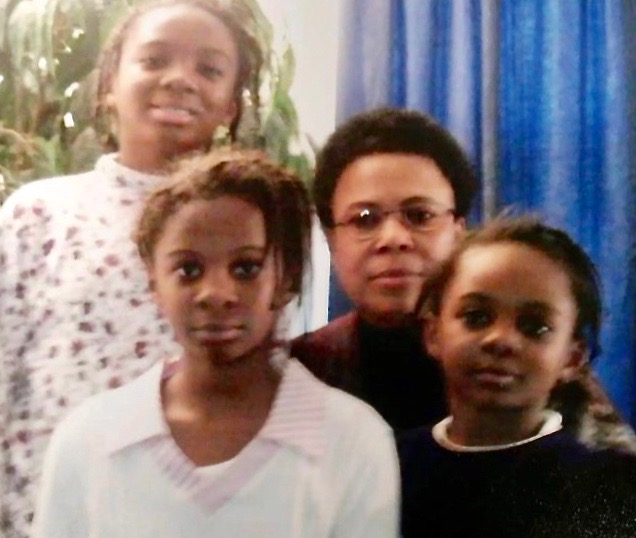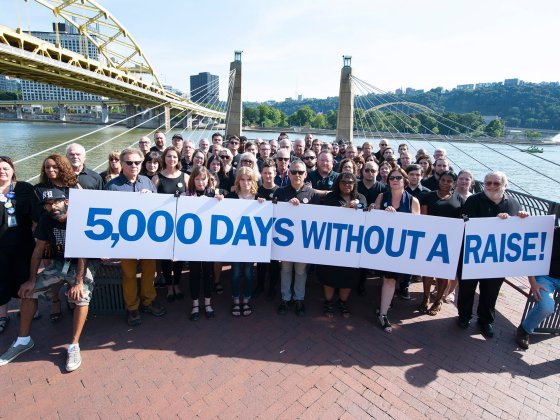Growing up, my mom would drive my sisters and me to Harvest Cathedral in my hometown of Macon, Georgia. I’d walk into children’s church, where praise and worship had already begun, and find a spot in the second row.
The room was dimly lit by colorful lights that danced around the ceiling, creating a fun yet reflective space for kids to worship. While everyone else had their hands raised above their heads in reverent surrender, I’d keep my arms by my sides and do my best not to take up too much space, whispering my praises to the floor.
I was always the shyest girl in the room, no matter where I went.
‘Truly being alone with God’
Maybe it was the thought of closing my eyes and truly being alone with God that made me more reserved than usual in that space. I didn’t want to do something “wrong,” like block someone’s way or sing so loud that some kid in the back would audibly whisper, “Who is that?” I would’ve rather died than risk embarrassing myself like that, and I decided the easiest way to avoid that embarrassment was to hold myself back.

I think the feeling stemmed from pressure from my parents to be obedient and perfect. My parents were loving to my sisters and me as children, but if we disobeyed, we risked the chance of getting whoopings, which I was terrified of getting.
So, whenever we were in public, I made sure not to do anything that would embarrass my parents in front of their friends, or in front of strangers. Throwing tantrums or running buck wild in grocery stores were foreign concepts to me. “Stay in one place,” my mother always said.
When it came time to let loose, I didn’t know how.
Unfortunately, as I grew older, I learned that holding myself back came with consequences: Deep down, I felt like I would never truly know who I was because I refused to unlock my true potential.
Shy in the presence of most people
I spent most of my childhood feeling lost. Religion was a huge part of my life back then, and I talked to God about everything. I’d told him how excited I was to write in my first journal, asked him how to forgive my sister after she stole my toys—you know, the important stuff.
But whenever I was in the presence of other people, I was constantly frustrated because it felt like I wasn’t doing enough to show everyone how much I loved Him relentlessly.
My diffidence wasn’t just church-related, either. As the daughter of two Nigerian immigrants, my family and I were often invited to Nigerian parties in the community. Parents would dress up in beautiful traditional attire with embroideries that sparkled when they moved.
They would help the children cover their plates with plantains, puff-puff, jollof rice and more before spending the bulk of the evening sipping wine and malt beverages while kids sat off in the distance. After prayer was over and every speech was said, it was time for the part I hated the most: dancing.
Twirling to Afrobeats
For years, I hugged the walls at those Nigerian parties. I didn’t know the first thing about dancing; just the thought of me wiggling my arms and legs terrified me, so I couldn’t imagine what everyone else would think if I tried. I spent most of my time watching as other kids led their friends onto the dance floor and twisted and twirled to the Afrobeats.

My dad’s friends would often walk up and ask me why I wasn’t dancing, and I’d blush, shrug, look down and say that I’d dance when the next song played. Then I’d hide in the bathroom until the adult left and I prayed they wouldn’t come back to ask me again.
It was common for parents to say to my dad, “Your kids are so quiet!” which made me feel like it was a bad thing. I hated the q-word, mostly because it reminded me how much I was always holding myself back, just like I did while I was in church. Hell, I could hardly even raise my hand to ask for a tissue in class when I needed one because I was too afraid of the sound of my own voice.
Freezing up around my peers
My shyness became shame, and over the years my journals became filled with anecdotes about how horrible I felt. I hated when I knew the answer to a problem in class but did not have the courage to say it. I hated the way I froze up when another student teased one of my friends and I couldn’t find the right words to say. I hated being so voluntarily invisible, to the point where I questioned my own existence. If I was gone, would people even notice? I’d asked myself. Would they even care?
Most of all, I hated that the root of it all was just me being shy, like somehow it should have been easy to overcome even though it wasn’t. I felt like I was covered by a large, heavy blanket, wrapped in darkness and slowly suffocating because I couldn’t find a way out. God, I wanted to break free from it so badly.
One day when I was about 12 or so, I watched a video during a youth service that offered tips on all the different ways one could worship in church. I felt relieved when I saw it, so eager for guidance on a path I’d spent most of my life stumbling on for so long. Using a new strategy meant there was hope for me after all, and I was willing to do everything I could to make it work.
Practicing my prayers in private
I spent weeks practicing the different moves alone in my room, in hopes that one day I’d lift my hands above my head. I remember the different poses having names, like “No. 1 Fan,” when you just raise one pointer finger up to the sky, and another one that looked like you were pretending to carry something in front of you. I spent a lot of time doing the latter pose; carrying an invisible load just seemed a lot more comfortable, somehow.

It was around this time that my best friend from school asked me to perform in a talent show with her for her birthday, sashaying to a mashup of Beyoncé’s “Countdown” and Jackson 5’s “I Want You Back.”
I really didn’t want to do it. In fact, I tried my best to get out of it, missing practices and asking God to bless me with a cold. But every day that went by, my friend seemed so excited to dance with me, saying it was the only thing she wanted for her birthday.
I realized then that my decision to do it or not would have truly made a difference to her. She encouraged me and made me feel like my choice actually meant something, and if that was the case, why should I be the one to stop myself?
So, I did it.
Feeling proud of my moves
Sure, I forgot some of the moves onstage, but after a few beats I got back on track. My heart pounded the whole time and I could feel myself sweating beneath the stage lights, looking at a crowd of attentive parents and fussing elementary schoolers. As I flailed my arms and twirled my bony little hips, I couldn’t help but feel a little proud of myself.
The best part was when my best friend jumped around and embraced me, saying thank you and giggling about how fun it was. During the car ride home, my mom told me that she was thrilled that I’d stepped out of my comfort zone. Hearing her say that made any last lingering feelings of regret and embarrassment fade away.
As for those more personal moments at church, every week that passed I found my hands lifting a little higher until they were finally outstretched above my head. It was one of those moments where I was so overcome by emotion that I cried and cried and couldn’t stop crying. I had never felt more relieved in my whole life—all because I managed to lift my hands higher than they’d ever been in that space for years.
Moments like those taught me that a little encouragement can go a long way to relinquish feelings of self-doubt.
It’s finding a friend, a video or some other tool of encouragement that supports me and gives me the confidence to believe in myself, whether it’s in church, at school or in those quiet moments alone.
As I made my way from the corners of a dance hall to the middle of the dance floor, I knew it was something I wasn’t afraid of anymore. These days, you can find me twisting, shaking, dancing and moving on and off the dance floor. And I don’t plan on stopping anytime soon.






You must be logged in to post a comment.